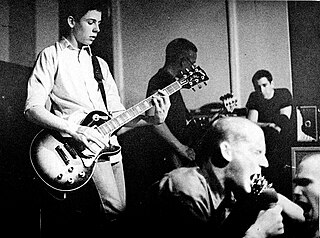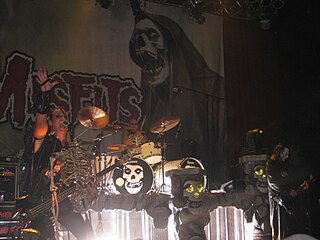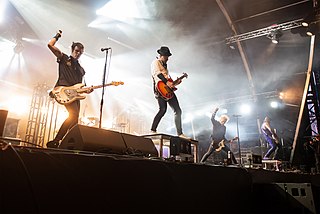Punk rock is a music genre that emerged in the mid-1970s. Rooted in 1960s garage rock, punk bands rejected the perceived excesses of mainstream 1970s rock music. They typically produced short, fast-paced songs with hard-edged melodies and singing styles, stripped-down instrumentation, and often shouted political, anti-establishment lyrics. Punk embraces a DIY ethic; many bands self-produce recordings and distribute them through independent record labels.

The punk subculture includes a diverse and widely known array of ideologies, fashion, and other forms of expression, visual art, dance, literature, and film. Largely characterised by anti-establishment views, the promotion of individual freedom, and the DIY ethics, the culture originated from punk rock.
Rock music is a broad genre of popular music that originated as "rock and roll" in the United States in the late 1940s and early 1950s, developing into a range of different styles from the mid-1960s, particularly in the U.S. and the United Kingdom. It has its roots in 1940s and 1950s rock and roll, a style that drew directly from the blues and rhythm and blues genres of African-American music and from country music. Rock also drew strongly from genres such as electric blues and folk, and incorporated influences from jazz, classical, and other musical styles. For instrumentation, rock has centered on the electric guitar, usually as part of a rock group with electric bass guitar, drums, and one or more singers. Usually, rock is song-based music with a 4
4 time signature using a verse–chorus form, but the genre has become extremely diverse. Like pop music, lyrics often stress romantic love but also address a wide variety of other themes that are frequently social or political. Rock was the most popular genre of music in the U.S. and much of the Western world from the 1950s to the 2010s.

Green Day is an American rock band formed in the East Bay of California in 1987 by lead vocalist and guitarist Billie Joe Armstrong, together with bassist and backing vocalist Mike Dirnt. For most of the band's career, they have been a power trio with drummer Tré Cool, who replaced John Kiffmeyer in 1990 before the recording of the band's second studio album, Kerplunk (1991). Before taking its current name in 1989, Green Day was called Sweet Children, and they were part of the late 1980s/early 1990s Bay Area punk scene that emerged from the 924 Gilman Street club in Berkeley, California. The band's early releases were with the independent record label Lookout! Records. In 1994, their major-label debut Dookie, released through Reprise Records, became a breakout success and eventually shipped over 10 million copies in the U.S. Alongside fellow California punk bands Bad Religion, the Offspring, Rancid, NOFX, Pennywise and Social Distortion, Green Day is credited with popularizing mainstream interest in punk rock in the U.S.

Hardcore punk is a punk rock music genre and subculture that originated in the late 1970s. It is generally faster, harder, and more aggressive than other forms of punk rock. Its roots can be traced to earlier punk scenes in San Francisco and Southern California which arose as a reaction against the still predominant hippie cultural climate of the time. It was also inspired by Washington D.C. and New York punk rock and early proto-punk. Hardcore punk generally disavows commercialism, the established music industry and "anything similar to the characteristics of mainstream rock" and often addresses social and political topics with "confrontational, politically-charged lyrics."

The Misfits are an American punk rock band often recognized as the pioneers of the horror punk subgenre, blending punk and other musical influences with horror film themes and imagery. The group was founded in 1977 in Lodi, New Jersey, by vocalist, songwriter and keyboardist Glenn Danzig. Danzig's first recruit to the Misfits was drummer Mr. Jim and bassist Diane DiPazza, however, DiPiazza never showed up. Mr. Jim was replaced by Manny Martinez shortly after. Jerry Only joined on bass guitar shortly after. Over the next six years, membership would change frequently, with Danzig and Only being the sole consistent members. During this time period, they released several EPs and singles, and with Only's brother Doyle as guitarist, the albums Walk Among Us (1982) and Earth A.D./Wolfs Blood (1983), both considered touchstones of the early-1980s hardcore punk movement. The band has gone through many lineup changes over the years, with bassist Jerry Only being the only constant member in the group.

Bad Brains are an American rock band formed in Washington, D.C. in 1976. They are widely regarded as pioneers of hardcore punk, though the band's members have objected to the use of this term to describe their music. They are also an adept reggae band, while later recordings featured elements of other genres like funk, heavy metal, hip hop, and soul. Rolling Stone magazine called them "the mother of all black hard-rock bands", and they have been cited as a seminal influence to numerous subgenres of heavy metal, including thrash/speed metal, alternative metal, funk metal and rap/nu metal. Bad Brains are followers of the Rastafari movement.

Sum 41 is a Canadian rock band from Ajax, Ontario. The band was formed in 1996 and most recently consisted of Deryck Whibley, Dave "Brownsound" Baksh, Jason "Cone" McCaslin, Tom Thacker, and Frank Zummo.
Doom metal is an extreme subgenre of heavy metal music that typically uses slower tempos, low-tuned guitars and a much "thicker" or "heavier" sound than other heavy metal genres. Both the music and the lyrics are intended to evoke a sense of despair, dread, and impending doom. The genre is strongly influenced by the early work of Black Sabbath, who formed a prototype for doom metal. During the first half of the 1980s, a number of bands such as Witchfinder General and Pagan Altar from England, American bands Pentagram, Saint Vitus, the Obsessed, Trouble, and Cirith Ungol, and Swedish band Candlemass defined doom metal as a distinct genre.

A metal umlaut is a diacritic that is sometimes used gratuitously or decoratively over letters in the names of mainly hard rock or heavy metal bands—for example, those of Blue Öyster Cult, Queensrÿche, Motörhead, the Accüsed, Mötley Crüe and the parody bands Spın̈al Tap, Green Jellÿ and Moxy Früvous.
Skate punk is a skater subculture and punk rock subgenre that developed in the 1980s. Originally a form of hardcore punk that had been closely associated with skate culture, skate punk evolved into a more melodic genre of punk rock in the 1990s similar to pop punk. Since then, it has predominately featured fast tempos, lead guitar playing, fast drumming, and singing. Occasionally, skate punk also combines the fast tempos of hardcore punk and melodic hardcore with the catchy hooks of pop-punk.

Derrick Leon Green is an American musician best known as the vocalist of Brazilian heavy metal band Sepultura. He joined the band in 1997 after the departure of band founder Max Cavalera.

1,039/Smoothed Out Slappy Hours is a compilation album comprising early recordings by American rock band Green Day, released October 1, 1991, on Lookout Records. Often erroneously referred to as the band's debut album, the compilation combines the band's actual debut 39/Smooth and its first two EPs Slappy and 1,000 Hours, as suggested by the amalgamation of the titles of the debut album and two EPs for the resulting compilation album. The album includes one cover, "Knowledge", which was originally by influential California punk band Operation Ivy, whose singer, Jesse Michaels, contributed the artwork for the album. The cover art features the same image from 39/Smooth.

Discharge are an English hardcore punk band formed in 1977 in Stoke-on-Trent, England. The band is known for influencing several sub-genres of extreme music and their songs have been covered by some of the biggest names in heavy metal and other genres. The musical sub-genre of D-beat is named after Discharge and the band's distinctive drumbeat.

Kerplunk is the second studio album by American rock band Green Day, released on December 17, 1991, by Lookout! Records. Kerplunk was Green Day's last independent release on the Lookout Records label, and was also the first album to feature Tré Cool on drums. Kerplunk officially includes only 12 tracks, but the versions released on CD and cassette also include the 4 tracks from the Sweet Children EP. One of those tracks is a cover of The Who's "My Generation". Green Day guitarist and singer Billie Joe Armstrong stated in a 2021 Vulture magazine interview that Kerplunk is his favorite album, citing it as "kind of autobiographical."

"Nazi Punks Fuck Off" is the fifth single by Dead Kennedys. It was released in 1981 on Alternative Tentacles with "Moral Majority" as the B-side. Both are from the In God We Trust, Inc. EP, although the EP version is a different recording from the single version. The single included a free armband with a crossed-out swastika. The design was later adopted as a symbol for the anti-racist punk movement Anti-Racist Action.

Come On Down is the debut EP by the Seattle-based alternative rock band Green River. It was released in November 1985 through Homestead Records, while the band were on their first US tour. It is considered the first grunge record because it was released several months before the Deep Six album that was compiled by six other Seattle grunge bands.

Friendly Green is the only album released by the alternative metal group Outface, most famous for being Sepultura vocalist Derrick Green's first published recording.

"Bang Bang" is a song by American rock band Green Day, released as the lead single from their twelfth studio album, Revolution Radio (2016), on August 11, 2016. Regarded as combining elements of the band's early punk rock days with themes from their politically motivated later albums, the song was inspired by the events of mass shootings in the United States and is written from the viewpoint of a mass shooter.
Japanese rock, sometimes abbreviated to J-rock, is rock music from Japan. Influenced by American and British rock of the 1960s, the first rock bands in Japan performed what is called Group Sounds, with lyrics almost exclusively in English. Folk rock band Happy End in the early 1970s are credited as the first to sing rock music in the Japanese language. Punk rock bands Boøwy and The Blue Hearts and hard rock/heavy metal groups X Japan and B'z led Japanese rock in the late 1980s and early 1990s by achieving major mainstream success.













